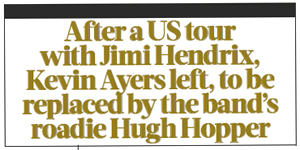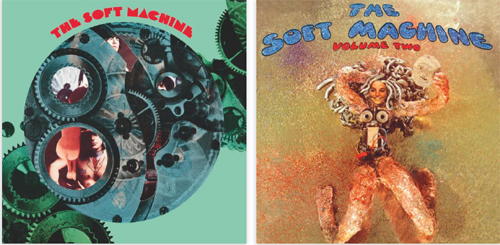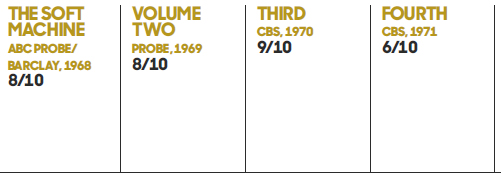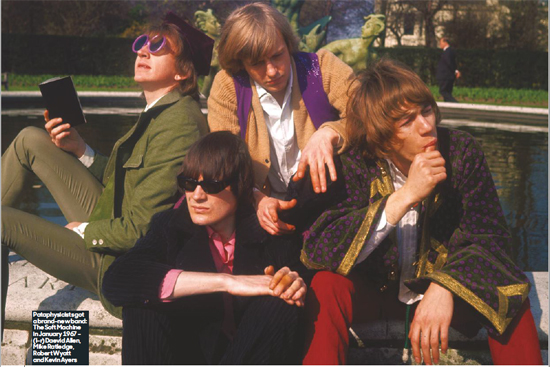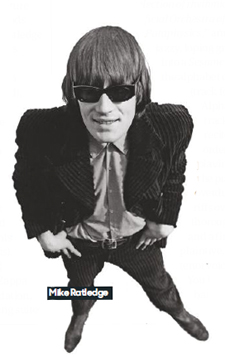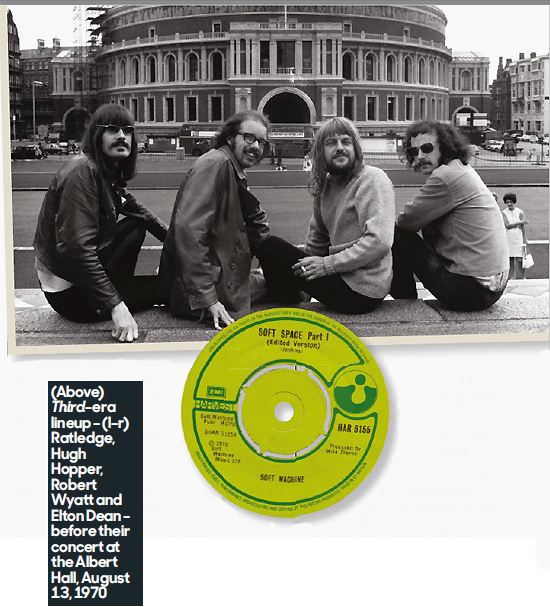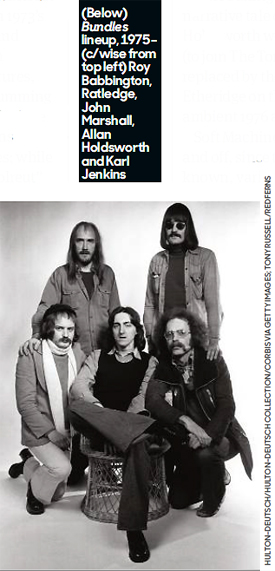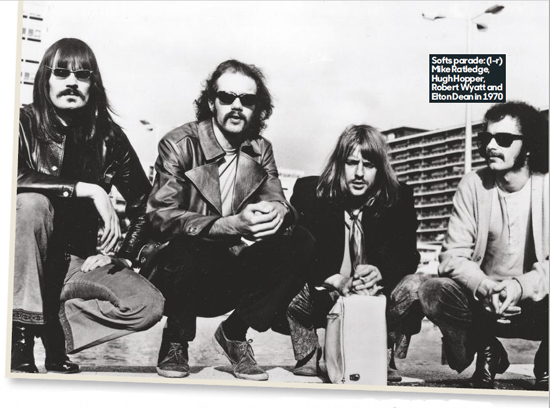| |
|
|
 Soft Machine - Uncut - The Archive Collection - 2019 Soft Machine - Uncut - The Archive Collection - 2019
|

|
OFT MACHINE have been several
different groups over the course
of their existence – a freakbeat
combo who morphed into pioneers
of psychedelic whimsy; an
experimental prog band who eventually
became a rigorous jazz rock act. The bulk of
their output has been instrumental, but they
still managed to spawn three distinctive
vocalists – Robert Wyatt,
Kevin Ayers and Daevid Allen – who
questioned the fundamental nature of
Anglo-American rock music.
Uniquely among prog-rock bands, Soft
Machine tended not to use guitars, but
they’ve still managed to feature several of
Britain’s top guitarists – Andy Summers
from The Police, fusion guru Allan
Holdsworth and jazz luminary John
Etheridge. And the band has been the
seedbed for dozens of other hugely
successful musicians – film composer
Karl Jenkins, big-name saxophonists
Elton Dean, Ray Warleigh and Theo Travis,
and drummers John Marshall and Gary
Husband have all passed through the band’s
ranks over the past half century.
|

|
The band formed in 1966, from the ashes
of the Daevid Allen Trio and the Wilde
Flowers, featuring drummer Wyatt, bassist
Ayers, Aussie guitarist Allen and organist
Mike Ratledge. The only recording made by
this quartet would be the February 1967single, “Love Makes Sweet Music” – a piece
of charming freakbeat, not quite poppy
enough for Ready Steady Go!, yet not quite
freaky enough for the Summer of Love.
Its flipside, “Feelin’, Reelin’, Squealin’”,
is closer to the hippie ideal, a piece of
flute-drenched psychedelia featuring a
growling baritone-voiced Kevin Ayers on
the verses and a tenor-pitched Dadaist
chorus from Wyatt. It would also be the
last recording that the band would release
featuring a guitar for nearly a decade.
An early live engagement saw them on the
French Riviera, playing in a production of
Picasso’s outrageous, erotic play Desire
Caught By The Tail and already displaying
a fondness for jazz-inspired improvisation.
Allen left the band on the way home –
denied re-entry to the UK for overstaying the
terms of his initial visa from Australia, he
stayed on the Continent to form the Anglo-
French outfit Gong – but his surrealist vision
lived on for the first two Soft Machine
albums. In particular was Allen’s interest in
the teachings of the French “pataphysicist”
Alfred Jarry, an eccentric, proto-Dadaist
prankster who counted Picasso, Gauguin,
Duchamp and Oscar Wilde as friends.
The three-piece band’s debut album,
1968’s The Soft Machine, is a wonderfully
endearing collection of skewed pop songs. It
was played with a certain rigour that owed
much to the band’s contemporaries the Jimi Hendrix Experience (whom the band
would support on a mammoth US tour that
year), but Wyatt, Ayers and Ratledge all
wore their experimentalism lightly – like
Alfred Jarry, this was a band who were very
consciously not taking themselves too
seriously. “Why Am I So Short?” is a hymnal
piece of Wyatt whimsy, “So Boot If At All”
has a certain heavy rock swagger, with
organist Mike Ratledge playing like a
metal guitarist; “Why Are We Sleeping”
prefigures early Blur; while “We Did It
Again” is a hypnotic one-chord groove
that anticipates the motorik krautrock that
Can would be making a few years later.
The album’s highlight might be “Lullaby
Letter”, an angular proto-punk miniature
with unusual chord changes that sounds
oddly reminiscent of Nirvana, with Ratledge
again playing a heavy metal solo on his
Lowrey organ.
After the US tour with Hendrix (when
Andy Summers briefly joined the band),
Ayers left, to be replaced by the
band’s roadie Hugh Hopper, and the
band regrouped to create the 1969
LP Soft Machine Volume Two, which
takes the Jarry-esque absurdism
of the first album into an almost
symphonic dimension. The
influence of the band’s friends Pink
Floyd is strong (Wyatt, Ratledge and
Hopper had backed Syd Barrett on his
1968 solo debut, The Madcap Laughs).
But the band also take a conceptual
direction that owes much to Frank Zappa
(apparently, on Zappa’s recommendation,
they split the album’s two dominating suites into a shorter series of segued tracks to
maximise on publishing income).
The first
of these, “Rivmic Melodies”, is a 17-minute
suite filled with compelling shorter pieces.
“Good evening, we now have a choice
selection of rhythmic melodies from the
Official Orchestra of the College of
Pataphysics,” announces Wyatt over a
jazzy, loping groove, before launching
into a Sesame Street-style recitation of
the alphabet over a quirky melody
(track four, “A Concise British
Alphabet, Pt II”, repeats the
track with the alphabet
recited in an entirely random
order). Anchored by Ratledge
playing suspended chords on
the piano, often with him
overdubbing buzzsaw organ
riffs over the top, it’s a
thoroughly appealing album,
and a fine vehicle for Wyatt’s
plaintive, mischievous choirboy
tenor voice. “Dedicated To You But
You Weren’t Listening” is a lovely
baroque ballad, while “Hibou
Anemone And Bear” and
“Orange Skin Food” both spin out into the
kind of territory explored by Frank Zappa on
Hot Rats, with Hugh’s brother Brian Hopper
playing harmonised solos on multiple reed
instruments. Best of all might be “Hulloder”,
presumably written in the States, where
Wyatt checks his privilege over the course
of a lengthy, stream-of-consciousness
ramble (“If I was black and I lived here/I’d
want to be a big man in the FBI… but as I’m
not/And because I’m free, white and 21/I
don’t need more power than I’ve got/Except
sometimes when I’m broke”).
The entire album is a cornucopia of ideas,
any one of which could have seen them
moving in a dozen different directions. The
direction that they did end up taking, like
many other jazz-loving rock musicians, was
inspired by Miles Davis’s album Bitches
Brew. At the end of 1969, Wyatt visited a
London jazz club where the pianist Keith
Tippett was performing with his eight-piece,
one that would later feature on his 1970
Polydor album You Are Here... I Am There.
Wyatt was impressed by the horn frontline
that lurched between tightly written
harmonies and free improvisation. “We
asked if we could borrow them to add spice
to our distinctive but inflexible ‘bees-in-a-bottle’
sound and they generously agreed to
help out,” says Wyatt.
Elton Dean (alto saxophone), Marc Charig
(cornet) and Nick Evans (trombone), along
with Lyn Dobson (flute and alto) and Jimmy
Hastings (flute and bass clarinet), were
added to the Soft Machine lineup, forming
a short-lived septet (Soft Machine weren’t
alone in their admiration of Tippett’s band – King Crimson also hired Tippett,
Charig and Evans around this time).
The resulting album, 1970’s Third,
turned out to be the way station between
psychedelic prog and full-on jazz rock.
Hugh Hopper’s composition “Facelift”
is a challenging and intriguing mix of
ambient free improvisation and jazzy,
high-pressure rock. It is a blend of two
live performances recorded at Croydon’s
Fairfield Halls and then manipulated in
the studio, Teo Macero-style, and subject
to post-production tape loops. Ratledge’s
“Slightly All The Time” starts as a playful
swing groove that moves into several
stages and shifting time signatures; while
the closing track, “Out-Bloody-Rageous”,
starts and ends with a nod to Terry Riley’s
A Rainbow In Curved Air, with overdubbed
layers of organ creating a ghostly,
hypnotic quality for the first and last
five minutes of the track, sandwiching
a jagged 7/4 groove that features one of
Mike Ratledge’s best fuzz-organ solos.
The album’s penultimate track, Wyatt’s
“Moon In June”, might be the band’s
masterpiece, but it was one that Ratledge
and Hopper didn’t particularly like. Wyatt
sings a highly self-referential lyric that
provides a running commentary of the
recording process (the words would change
when he performed the song live, at BBC
Radio sessions, or at the Prom concert that
Soft Machine headlined that summer).
Wyatt plays drums, bass and keyboards
for most of the track, his sparse approach
reminiscent of his forthcoming solo albums
like Rock Bottom. “Moon In June” could
have augured a new era for the band as a
Wyatt-esque conceptual pop group, but
instead it became the band’s last vocal
track. 1971’s Fourth sidelines Wyatt and
it would be his last with the band. Hugh
Hopper is the dominant songwriter, and
many of the textures explored by the band
start to become self-consciously jazzier. Roy
Babbington joins the band on four tracks to
play upright bass, complementing Hopper’s
bass guitar, while Ratledge puts his electric
piano through a ring modulator – an FX unit
popular with the likes of Herbie Hancock
and Chick Corea. Elton Dean’s first
songwriting contribution, “Fletcher’s
Blemish”, is a series of tightly written
cued passages that are linked by free
improvisation, consciously referencing
Bitches Brew.
Ratledge writes the bitty,
fiddly “Teeth”, while Hopper’s “Virtually”
is a four-part suite that moves between
gentle harmonies and free-jazz freakouts.
The waltzing “Kings And Queens” is a rare
point of meditative peace on the album.
By the time of Fifth (1972), Soft Machine
had fully morphed into a fusion outfit,
broadly along the lines of Chick Corea’s
Return To Forever or John McLaughlin’s
Mahavishnu Orchestra. Wyatt had been
replaced by two jazz drummers – Phil
Howard on side one, John Marshall on side
two – both playing with a weird degree of
restraint. Ratledge had ditched his Hohner
pianet, the clunky-sounding electric piano
he’d used on previous albums, and started
using a Fender Rhodes, feeding it
through numerous effects units
and enjoying its glossy, ethereal
qualities on tracks like “M C” and
the aqueous ambient jazz of
“Drop”. “All White” is a rigorous
modal groove in 7/4, “Pigling
Bland” is an episodic funk ballad,
while “As If” is a fidgety and
idiosyncratic piece of collective
improvisation written by Ratledge.
What becomes apparent is that, for all the
meretricious playing, there is no-one in the
band capable of acting as a Chick Corea or a
Herbie Hancock. Ratledge is great at texture
and at “comping” (providing inventive
backing for others), and he could get away
with playing simple fuzz-rock riffs on his
wheezy, buzzy Lowrey organ in earlier
incarnations of the band. But, as a
classically trained pianist dabbling in
jazz, his limitations as an improviser
become apparent. Even the band’s strong
instrumentalists, like Elton Dean, seemed
reluctant to really take the lead.
Dean left after Fifth to be replaced by multireedist
Karl Jenkins from Ian Carr’s Nucleus,
who started to dominate the band on 1973’s
Six, a double album that mixes live and
studio recordings. A voyage through
enjoyably disorientating time signatures,
“37 ½” features some impressive drumming
from John Marshall; “EPV” and “Lefty” are
both interesting ambient explorations
featuring an FX-laden Fender Rhodes; while
the funky groove of Ratledge’s “Gesolreut”
recalls Eddie Harris’s “Freedom
Jazz Dance”, the soul-jazz
standard covered by Miles Davis.
The most memorable track on
the studio album is “Stanley
Stamp’s Gibbon Album” a
propulsive groove set around
Ratledge’s fugal piano riff. But
it’s the angular “Stumble” that
sets out Jenkins’ stall as a
songwriter, and sets the tone
for how the band would continue
on 1973’s Seven.
By now Hopper had left, to be
replaced by Roy Babbington, and
the writing is dominated by
Jenkins, who pens
seven of the tracks,
specialising in simple,
static and rather
repetitive grooves like
“
Nettle Bed”. “Carol
Ann” is a pretty,
spartan ballad, “Day’s
Eye” is a rigorous workout
in 9/8, while Ratledge
introduces a synth to the band
for the first time – a modular
analogue EMS model called the AKS.
It’s tempting to see subsequent albums
as an afterthought, but Bundles (1975) is
a fascinating change in direction. Ratledge
is increasingly sidelined – Jenkins is even
starting to overdub keyboards – but the real
USP is that the band have introduced guitar
for the first time since their debut single.
Where the sonic space usually occupied by
guitar was filled by Ratledge’s FX-laden
keyboards, here Allan Holdsworth starts
to dominate proceedings, playing with
a John McLaughlin swagger on “Hazard
Profile”, showing an ECM delicacy on
“Gone Sailing” and telling a compelling
narrative tale on “Land Of The Bag Snake”.
Holdsworth would soon be lost to America
(to join The Tony Williams Lifetime), to be
replaced by the more introspective John
Etheridge on the rather reflective and
ambient 1976 album Softs.
Soft Machine have continued to exist, on
and off, since then, as a legacy project – also
known, variously, as Soft Ware, Soft Works
and Soft Machine Legacy –
drawing from an alumni of
around 50 people and often
featuring some very big
names in British jazz
(including John Taylor,
Dick Morrissey and Theo
Travis). But their repertoire
concentrates almost
exclusively on the mid 1970s
incarnation of the band.
There are dozens of
fascinating iterations of
Soft Machine that could
provide fruitful territory
for exploration.
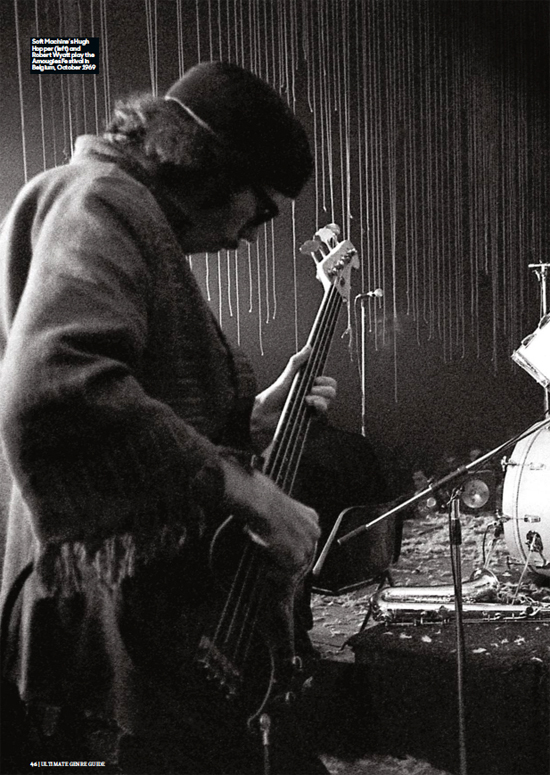
[
Below : this interview is also published here]

|
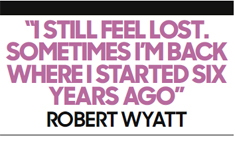 |
|
possessed under the hot lights of the Albert Hall
during the Softs’ televised concert; and then there
is Robert sitting with bitter tears in his eyes in a
dressing room in Rotterdam because he hates the
performance he has just given.
Because, you see, he’s nothing if not an
emotional person. He is also nothing if not
a nice person, and niceness is not an excessively
common quality among musicians and
entertainers. Much of the secret of his success
is that people respond so readily to his
spontaneity and generosity of spirit. Everybody
wants to work with him, and when they have
made the gig they come back for more. There was
nobody happier and more elated amongst those
50 people in Centipede than Wyatt, and no one
more brought down when the band received
reviews that were generally cautious and, in
one instance, bitterly hostile.
“I’m upset, not for my own sake,” he explained
later, “but for Keith and Julie.” And he meant it.
How do you feel about interviews, Robert?
“
I regret most I’ve done when I see what’s
happened, but then I regret most performances
on records, too. I think one of the big difficulties
is that written words and spoken words aren’t
the same thing. You actually think different
things in print – I do. Things I say, words I use in
speech, if I was writing down the same thought,
I actually wouldn’t use the same word. There’s
nothing anybody can do about that, really. It’s
misleading. I find I say things just to pad some
things out, or to be clever for a minute while I’m
trying to think what I really think. I can see the
value of them, but I still find it makes demands...
It upsets me sometimes, put it like that. But that’s
true of anything.”
But Hugh [Hopper] and Mike [Ratledge] don’t
like interviews, do they?
“Well, Hugh is
pathologically shy. Very. The fact that he goes on
stage is part of it. You don’t get up on your own,
you get up with equipment and amplifiers and
volume. It’s very private on stage; it’s not an
exhibitionistic thing to do at all.
“People are often surprised at musicians and
performers being introverts but it doesn’t surprise
me. What surprises me is that people who are
extroverts are musicians. What amazes me is
when a brilliant musician is an extrovert, because
if they’re extrovert it probably means that they
spent their time in their teens rushing round
coffee bars meeting people, and I’m
surprised that they had the time to learn
to play anything at the same time.
“Whereas I find that introverts are less
social people, are very often the ones who
learn to play instruments properly. The
one way you can hide is to be a performer,
because it’s really a false identity to be
on stage. You can really feel untouchable
and private.
“The group has become primarily
instrumental, for instance, because of
our characters, in a way. We’re a very
unplanned group in our direction. We just
sort of drift from whatever area seems to
excite us at the moment to whatever other
area seems to excite us. Even the simple
things, like the gaps, the lack of gaps, is
because we are embarrassed, I think, to
have a silence on stage where the audience is expected to react back to us. I just find that
totally embarrassing – ending a number, bang,
then straight into the next one, all that business.
I can’t bear it.”
You don’t always appear happy with the
group... What do you think it’s doing wrong
for you personally?
[Long pause] “All the things
you can talk about in music we agree on. We all
share similar ideas on the possibilities of freedom
and the different types of freedom, and structure,
and discipline, and what use they are, and when
they’re useful and when they are not, and how to
cooperate, and still express yourself. But music
isn’t, like, conscious ideas, concepts, if you had
them; the real music is the way you play, the
actual note that you put after the note before.
“And quite simply, sometimes we aren’t playing
the same piece of music – the drumming isn’t
the drumming for the bass line that Hugh’s
using, or there’s another bass line that isn’t being
played, or the rhythm section thing that should
be with Mike’s organ solo isn’t because Hugh and
I are somewhere else. The idea, after all, is not to
create four pieces of music but one piece of music,
and I’m upset on nights when we create four
pieces of music.”
So what have you gained musically from the
Symbiosis?
“Since the summer, since I’ve started
playing with Kevin, I’ve realised that in other
contexts there are things in me which come out
and never seem to come out when I play with Soft
Machine. It’s not a question of quality at all, it’s
just a question of different situations demand
different skills, and I hadn’t realised just how
much you do adapt and just play what seems
necessary. I would be very loath to put a word to
it and think of a concept which fits what I mean.
“All I know is that when I get on a kit, and there’s
Roy Babbington on me left and whoever it might
be, Neville Whitehead or someone, and Gary [Windo] and Nick [Evans], that a whole different
thing happens. I just lift up me sticks and
immediately something else happens and
different situations arise that would never
arise with Soft Machine. I just play completely
different things.
“Symbiosis is different people. All music is a
cooperative thing, you see. Beyond all people’s
individual talent is a shared talent, which
the music has. How to pin down the best
relationship... European music sort of solidified
in a way into an almost military hierarchy of
composer, conductor and orchestra.
“What happens is, there’s a kind of assumption
that the type of person who conceives the music
is a different kind of person from a performer –
that’s what European music assumes, although
many great European composers have been
virtuoso performers of their own work, and
many great composers are great conductors. But
generally speaking, this is a hierarchy that’s
accepted, and the fact is that in my opinion the
most vital influence on music has been the black
music of the past 50 years.
“The most interesting thing it seems to me,
that has been suggested by black music, is that,
as in, say, painting, the person who conceives
of it and the person who plays it can be one and
the same – combine both skills in one person.
And this seems to me the most interesting,
challenging thing that jazz music has come up
with that European music doesn’t really like to
get to grips with. And what Symbiosis is, is a
complete imbalance; in other words, we’re all
blowers without any of the composers, or when
we do have composers – like Keith was with us
the other night – he’s not in a composing or
controlling role at all.
“And so it’s an incredible risk, Symbiosis every
night, because we just turn up and play. The
responsibility is enormous; you’ve got to be on
form then and there because you’re going to be
doing all the composing and all the performing
at the same time, and so is everybody else.”
Would you agree that this seems to be a very
interesting period for young jazz musicians
and the thinking rock musicians? They really
seem to be coming together.
“Well, Centipede
is directly responsible for Symbiosis and so on.
Yeah, I think so. For me, I find it staggering, and
a bit scary, because it seems to me there’s so much
to do and so little to hide behind.
“There’s a lot of knowledge and wisdom
that’s been spread around in the last four
or five years. There’s no excuse for certain
types of musicians not knowing about
other types. The standards are so high
now! And the area of information you are
expected to cope with! I think there’s bound
to be a lot of messy stuff of journalistic
interest – interesting but disposable – but I
think it’s incredibly exciting. Short answer
to your question – yes.”
What do you think jazz people can
learn from those musicians with rock
references?
“That’s interesting. Before
I talk about it I think that if you think of it
as a blanket thing you’re in trouble; a band
created out of generalised theories sounds
like one to me, always. And a band made out
of people who’ve met and work together well sounds like that as well. There can be
as much difference in worlds between
two so-called rock musicians working
together, they can bring more
completely different things to each
other than a rock musician and a
classical musician.
“If there are any general things, I
think they’re the obvious ones. Jazz
musicians are now realising that there’s
nothing mature about consistently
drowning out your bass player and
pianist. There’s nothing childish about
getting your bass player and pianist
heard, even if it means they have to
play crude instruments such as bass
guitar and electric piano. There’s
nothing essentially immoral or
immature about it. The fact that rock
musicians assume that you’ve got to
hear the bass line – although very
often they overdo it – seems to me an
actual element of musical maturity
in rock. There’s an element of
childishness in jazz. There’s an
assumption that jazz musicians can do all the
teaching and rock musicians all the learning.
“If the soloist, for instance, is doing a
development upon a harmonic sequence and you
can’t hear the harmonic sequence, so you don’t
know what the solo lines are referring to, then you
lose the point of reference; you lose the lovely
cosmic hum, if you’ll pardon the expression; you
lose the sense of well-being, you lose, actually,
the music, and you just leave the ideas. It’s an
important thing in rock, the amplifiers and that,
and instead of being rude about them, I think
jazz musicians are realising more and more that
they’ve got a very important function and that
they’re solving problems that can’t be solved in
any other way in the immediate future.
“And I think rock musicians can learn from
jazz musicians. The most important thing they
learn is that you can get a lot more out of music
and put a lot more into it if you learn to play
properly. Quite simply, jazz musicians are
showing rock musicians that there’s an awful lot
of things you can do on a guitar and drum kits
that aren’t unnecessary or just technical fiddle
bits – they just expand your language.
“In practice, most jazz musicians tend to me to
be very involved in what they play – actually, the
relationship between them and their instrument;
and they’ve developed that to a very high extent –
a man and his bass, a man and his alto, a man and
his piano. And what rock has spent a lot more time
doing than most of jazz is studying the actual
effect and balance of what all these instruments
sound like from the outside on a stage.”
What do you think your strengths are as a
drummer?
“Well, I suppose it’s a bit late to say
this, but I don’t primarily think of myself as a
drummer. I think of myself as a catalyst for the real
musicians. How I see myself being most useful is
getting people at it slightly more than if I wasn’t
there, or even getting them together and at it. If I
was really into drums as an end I’d be sitting here
practising. But I haven’t got a practice pad! So long
as I can play well enough to pin down what’s going
on and to emphasise the pace that’s necessary.
“From the technical point of view I’m just
nowhere, really. I’ve always felt a bit uncomfortable since we started. Basically, I came
up to London to sing songs with Kevin [Ayers].
Five, six years ago. I’d done a lot of things before
then that were instrumental, but by instrumental
I don’t mean jazz or rock. In fact, the funny way
these discussions come to jazz and rock is that
I don’t see them as the two great sources from
which musicians are drawing.
“A lot of my richest sources of inspiration
come from not one musical idiom or the other
but from paintings, and theatre and people’s
characteristics that you haven’t seen come
through in music.”
But everybody is affected to a greater or
lesser extent by every experience they
encounter. Didn’t you once tell me you’d
learnt a lot by being told by Robert Graves,
the poet, to leave home at 16 and make your
own way in the world?
“Well, I lived with
him in Majorca for a while, and he became my
Mediterranean father in a way. He’s happy to have
me there, and I hadn’t left school when I first went
there, but he didn’t want me to loaf about in the
sun and just have a nice time and groove, which
is virtually the state he’s got to now, because he
has the traditional attitude that he’s done his
homework, built up something, and now he’s
out in the sun finishing it off, so to speak.
“I hadn’t earned it yet, somehow, and though
there was great love abounding it wasn’t one
which had to be constantly backed up by me
being there all the time or him coming here, just
that he felt I had to go out and do it, and then
when I’d got something that I’d done, maybe go
back and see him again. And I haven’t been back
yet because I don’t feel I’ve done anything yet
that would stand up to his kind of standards.”
So how did the tie-up with Graves originate?
“There’s a bunch of friends there in the early ’30s
who’d gone out there – poets and writers – and
their children, their grandchildren, got invited
out there by the people who stayed on there – you
know, the children of the people who went back
to England during the war. And I’m one of them.
He’s no relation, though my father’s first wife was
his secretary.
“There’s a kind of family of thinkers that my
parents belonged to, and to a certain extent
Robert Graves could be called the head of that
family. He’s a kind of distant tribal chief, though
it’s several generations removed. He had various
fights with me dad, who died some years ago. My
father at that time, he was a sort of brilliant young
Communist layabout, really [laughs].
“He’d done various things. He’d got a degree
in law at Liverpool, and then he did modern
languages at Oxford, and then he got on to do
psychology at Cambridge. A very bright bloke.
“He lived just long enough to realise that
I wasn’t going into university, which really
disappointed him. He died in a state of anger at
me, I’m afraid. But he was also a pianist, and
that’s definitely where I got my ideas from. The
house was full of music.
“And Graves, he’s incredible. There’s a colony,
a set, around him there. Mind you, I’m talking
about when I was there, which was before The
Soft Machine. I’ve got lots of friends who have
gone back there. Kevin spent some time there.
He got into Majorca as a place to live much more
than I did.”
So when you came up to London you were
going to sing with Kevin?
“Yes, I think that was
the idea; I didn’t really know. I’d been through a
period in my head very much like the stuff I’m
doing now, although not technically, probably.
The music I was listening to – had been listening
to – was Sunny Murray, Milford Graves and Cecil
Taylor, essentially. And Eric Dolphy, and Elvin
Jones, of course. And I arrived at the point where
I decided the simplicity of Kevin’s songs, and the
rightness and charm of them, had a fantastic
appeal to me after a couple of years of Sunny
Murraying and freak-out. And I’m now, I think,
at a similar stage. I’m likely now to get into the
stage that Chris Spedding has been through on
his album. I haven’t heard it, but what he’s said
about it I recognise, and I think a lot of us do.
“In fact, it’s becoming a long syndrome in music
– people going from complexity to simplicity. But
I still feel very lost, actually. Sometimes I’m back
where I started six years ago. I’ve to go through
the cycle all over again now.”
|



